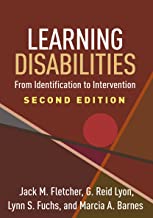Learning disability
Learning disabilities are due to genetic and/or neurobiological factors that alter brain functioning in a manner which affects one or more cognitive processes related to learning. These processing problems can interfere with learning basic skills such as reading, writing and/or math.
Cluster Number:
Wiki Number: W114
Diagnosis: Learning Disability-Learning Disorder
US Patients:
World Patients:
Sex Ratio:
Age Onset:
Brain Area: brain operates more slowly; heredity and genetics, family poverty
Symptoms: Differing ability to speak, liten, read, write, spell, reason, organize information and do math. Usually average or higher intelligence.
Progression:
Causes: Low expectations by parents, teachers or others may stigmatize and worsen the problems. Self-esteem may be built aside of school.
Medications:
Therapies: Schools are challenged by the mental difficulties many children go through. This is even more-prevalent with second-languages.
Youtube Video: Understanding Learning Disabilities
Amazon or Library Book: Learning Disabilities
Click the book to link or order from Amazon.

